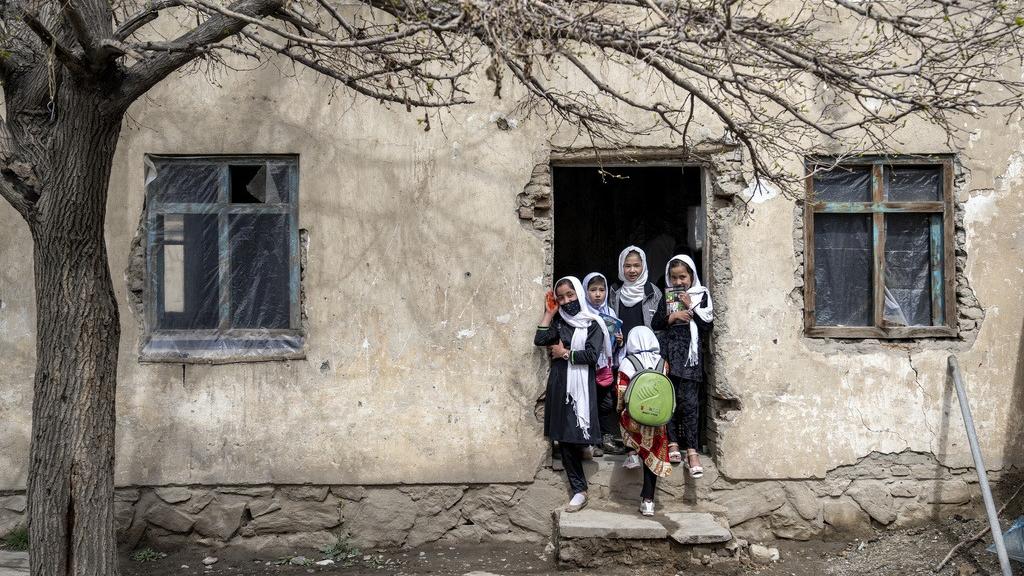 Afghan school girls attend school on the first day of the new school year, in Kabul on March 25, 2023. (PHOTO / AP)
Afghan school girls attend school on the first day of the new school year, in Kabul on March 25, 2023. (PHOTO / AP)
UNITED NATIONS/GENEVA - The UN's lead agency for gender equality on Tuesday called on the global community to persistently advocate for change in Afghanistan, highlighting the Taliban's sweeping and unparalleled restrictions on the rights of women and girls throughout the nation.
Sima Bahous, executive director of UN Women, made the appeal in a statement marking two years since the Taliban regained control of the country.
"Through over 50 edicts, orders and restrictions, the Taliban have left no aspect of women's lives untouched, no freedom spared. They have created a system founded on the mass oppression of women that is rightly and widely considered gender apartheid," she said.
"I urge the Taliban to reconsider and to weigh the cost of these acts for Afghanistan's present and future," Bahous added.
 Afghan women and children walk amid rainfall along a road in Paghman district on the outskirts of Kabul on March 30, 2023. (PHOTO / AFP)
Afghan women and children walk amid rainfall along a road in Paghman district on the outskirts of Kabul on March 30, 2023. (PHOTO / AFP)
Bahous emphasized UN Women's steadfast and resolute dedication to the women and girls of the nation.
She said the agency's work there is anchored in its fundamental relationships with women, who have described how these "misguided, cruel and ultimately self-defeating" measures have affected their lives.
Through over 50 edicts, orders and restrictions, the Taliban have left no aspect of women's lives untouched, no freedom spared. They have created a system founded on the mass oppression of women that is rightly and widely considered gender apartheid ... I urge the Taliban to reconsider and to weigh the cost of these acts for Afghanistan's present and future.
Sima Bahous, executive director of UN Women
"Despite these challenges, Afghan women also tell me that they will not give up or give in. They will continue to lead the struggle against their oppression," she said.
"In the face of the most hostile of circumstances they speak out against the violations, deliver lifesaving services, own and operate businesses, and run women's organizations. Their bravery must inspire us to greater action, their example to renewed determination," Bahous said.
ALSO READ: Afghanistan aid donors struggle with ban on women, less money
Bahous called for heightened support for Afghan women, ranging from amplifying their voices and needs to financing essential services and backing their enterprises and groups.
"I urge the international community to continue to apply every pressure and employ every means at their disposal to press for change, including by answering the call of the humanitarian community and fully funding the humanitarian appeal for Afghanistan," she said.
The UN human rights high commissioner, Volker Turk, used the occasion to remind the de facto authorities of their obligation to uphold the rights of all, including women and girls.
UN human rights personnel persistently operate in Afghanistan, overseeing, recording, and championing various human rights matters, from basic liberties to safeguarding civilians in conflicts and upholding detainee rights.
"We are engaging with the de facto authorities on these issues and remind them of their obligations under international human rights law," said Liz Throssell, a spokesperson with the UN human rights office, OHCHR, in Geneva.
The high commissioner emphasized the need for the international community to remain attentive to the challenges faced by all Afghans.
 Afghan women receive food rations distributed by a humanitarian aid group, in Kabul, Afghanistan, on May 28, 2023. (PHOTO / AP)
Afghan women receive food rations distributed by a humanitarian aid group, in Kabul, Afghanistan, on May 28, 2023. (PHOTO / AP)
Humanitarian aids
Also on Tuesday, UN officials and partners said continued humanitarian support coupled with investment in long-term solutions are urgently needed for Afghanistan as economic hardships haved severely affected living conditions in the country.
The International Federation of Red Cross and Red Crescent Societies said in a press release that about 28 million Afghans struggle to meet basic needs.
William Spindler, a spokesperson for the UN High Commissioner for Refugees, told a press briefing that UN and non-governmental organizations' operations had been affected by restrictions, including bans on female national staff.
READ MORE: UN chief: Afghanistan faces 'largest humanitarian crisis'
Margaret Harris, a spokesperson for the World Health Organization, said there were 9.5 million people with little or no access to even basic health services, and 20 percent of the country's population were suffering from mental health problems, 4 million from drug addiction and associated disorders, and 875,000 children were suffering from severe acute malnutrition.


